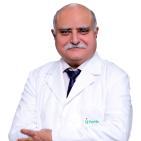
Post Heart Attack Recovery - What to Expect and How to Heal
Recovering from a heart attack is a critical and often lengthy process. Here’s what you can expect and how to facilitate your healing and regain your overall health:
1. Hospital Stay: You’ll spend several days in the hospital after a heart attack. During this time, you’ll be monitored, and medical professionals will provide immediate treatment and guidance.
2. Medications: You’ll likely be prescribed medications to manage your heart health. Common medications include blood thinners, antiplatelet drugs, beta-blockers, and ACE inhibitors.
3. Lifestyle Changes: Your healthcare team will emphasize the importance of lifestyle changes, such as quitting smoking, adopting a heart-healthy diet, maintaining a healthy weight, and getting regular exercise.
4. Cardiac Rehabilitation: Cardiac rehab programs offer structured exercise, education, and support to help you recover. Your healthcare provider may recommend participating in one.
5. Emotional Recovery: The emotional impact of a heart attack can be significant. Seek support from loved ones and consider counselling or therapy to address anxiety, depression, and stress.
6. Return to Normal Activities: Your healthcare provider will provide guidance on when it’s safe to return to work, drive, and engage in regular activities. This varies for each person.
7. Follow-up Care: Regular follow-up appointments with your healthcare provider are crucial to monitor your recovery, adjust medications, and assess your overall progress.
8. Diet Modifications: Maintain a heart-healthy diet that’s low in saturated and trans fats, sodium, and lean proteins.
9. Exercise Routine: Gradually incorporate regular physical activity into your routine, following your healthcare provider’s recommendations. Start slowly and progress as tolerated.
10. Medication Adherence: Take your prescribed medications as directed and discuss any side effects or concerns with your healthcare provider.
11. Stress Management: Practice stress-reduction techniques like meditation, deep breathing, or yoga to support your emotional well-being and overall heart health.
12. Family Support: Engage your loved ones in your recovery Process, and consider involving them in lifestyle changes to create a supportive environment.
13. Know the warning signs: Be aware of the warning signs of another heart attack and seek immediate medical attention if you experience any concerning symptoms.
14. Communicate with your healthcare Team: Don’t hesitate to reach out to your healthcare provider if you have questions or concerns about your recovery or any new symptoms.
Remember that post-heart attack recovery is a gradual process, and each person’s experience is unique. Patience, dedication to a heart-healthy lifestyle, and open communication with your healthcare team are crucial for healing and reducing the risk of future heart issues.
Categories
Clear allMeet the doctor

- Cardiac Sciences | Adult CTVS (Cardiothoracic and Vascular Surgery) | Heart Transplant | Heart & Lung Transplant | Vascular Surgery | Paediatric CTVS (Cardiothoracic and Vascular Surgery)
-
38 Years
-
1600



















